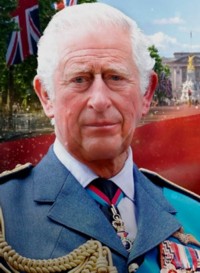Last Time
When George VI died unexpectedly in February 1952, I was just 6 years old, so the impact of his death on me, despite my parents' laments for a good wartime leader and their sitting up to listen to his funeral on the radio, was not great.
At Thornleigh Primary School school assemblies I was aware that there was a change because the National Anthem changed and we now sang God Save The Queen.
Usually, we would just sing the first verse, accompanied by older children playing recorders, but on special occasions we would sing the third verse too. Yet for some mysterious reason, never the second.
The Coronation was a big deal in Australia, as well as in Britain and the other Dominions (Canada, South Africa and New Zealand) and there was a lot of 'bling': china; tea towels; spoons; and so on. The media went mad.
In our household, two gold booklets to celebrate the forthcoming Coronation, arrived in the mail from Grandma (my mother’s mother) who was, at that time, a member (Chair?) of the Newcastle upon Tyne Education Committee, one each for Peter and for me.
In 1600, that loyal City, that would later fight off the Scots, particularly the Jacobites, three times, had received its Letters Patent from Queen Elizabeth I. Now, my grandma and her fellow councillors enthusiastically welcomed a new Queen Elizabeth to the throne.
I, like most people of English nativity, made the assumption that the two Elizabeths were related in some discernible line of succession, although I soon learnt that Elizabeth I was the Virgin Queen (well not actually, if the historians are correct, but she had no offspring). But at least her little son, one day to be King Charles III, must be in a direct line of succession from the previous two Charles. So, that was all as it should be.
Accompanying the gold booklet was a larger folder of thin colour-printed cardboard sheets that could be cut-out, carefully, to assemble, in three dimensions, the royal coach and horses (tab A goes into slot A and so on), together with various royal accoutrements: the orb; crown; sceptre, mace (rod) and sword that were also assembled, and the whole placed, in pride-of-place, on the wide sunroom windowsill, where it sat, until reduced to confetti by the Australian sun.
We were invited to get to know our young Queen and her attractive family, Prince Phillip, young Charles (Heir Apparent) and little Anne.
A little later, another parcel came from England, this time from Granny Welsh (my father’s mother). Incomprehensible to me at the time, it's been of much more lasting utility. It’s a special edition of the Book of Common Prayer, containing the Coronation order of service. It also contains Elizabeth I’s 'Articles of Religion' (the 'true' religion as it says in Latin on her tomb in Westminster Abbey), as well as containing that mysterious second verse of the National Anthem.
The second and third verses of God Save the Queen
Thus primed, we all sat up, on a cold June evening in 1953, around a roaring fire in the living-room, for the Coronation broadcast. Later, we would travel into the city to see highlights, in colour, at one of the several newsreel cinemas that then existed.
|
|
| No responsibility is accepted for linked third party video or media content - see Terms of Use and Copyright. You follow any YouTube links or advertisements displayed at your own risk. |
Soon our coins (shillings and pence and their divisions) and paper currency (ten-shilling notes) bore another head.

